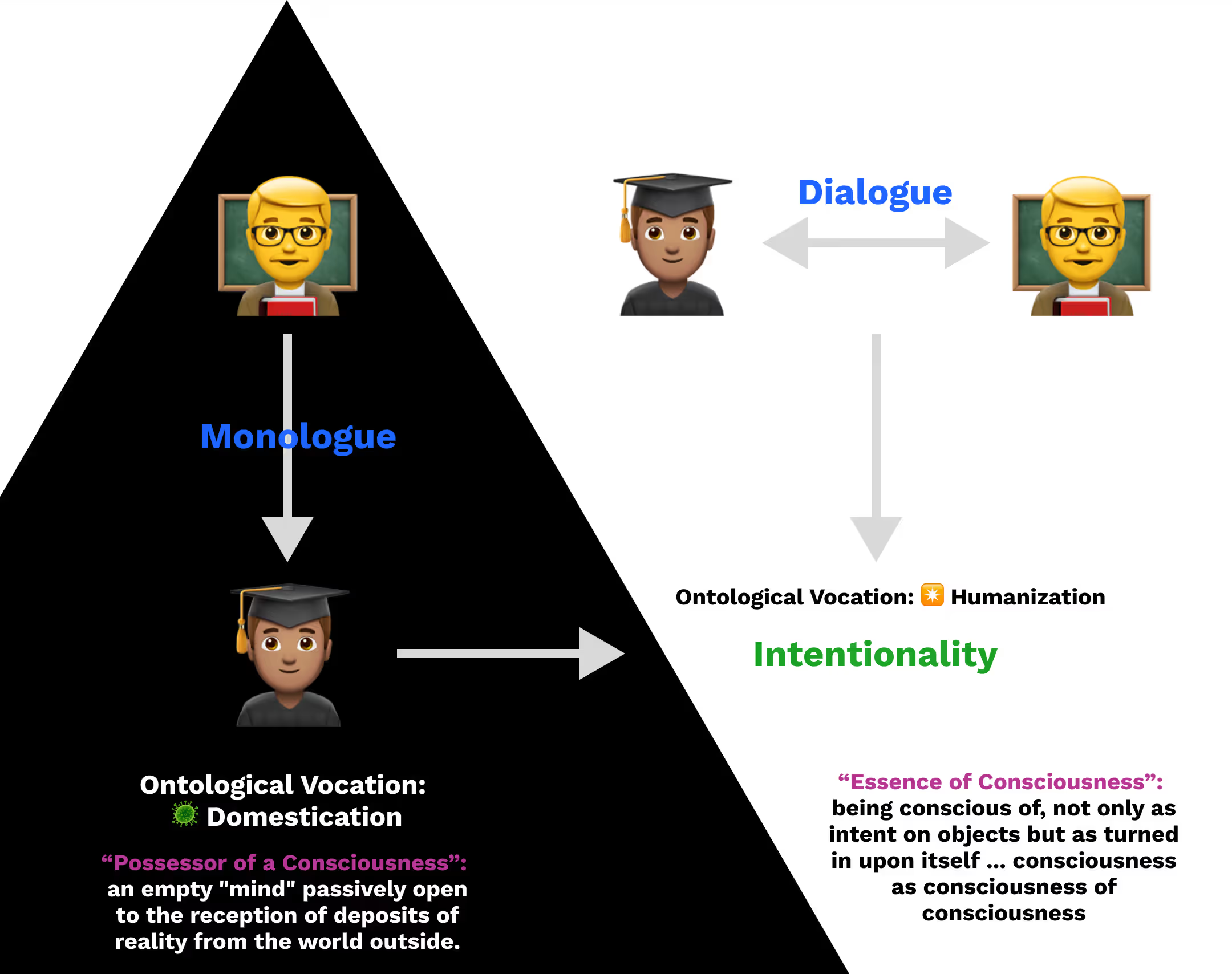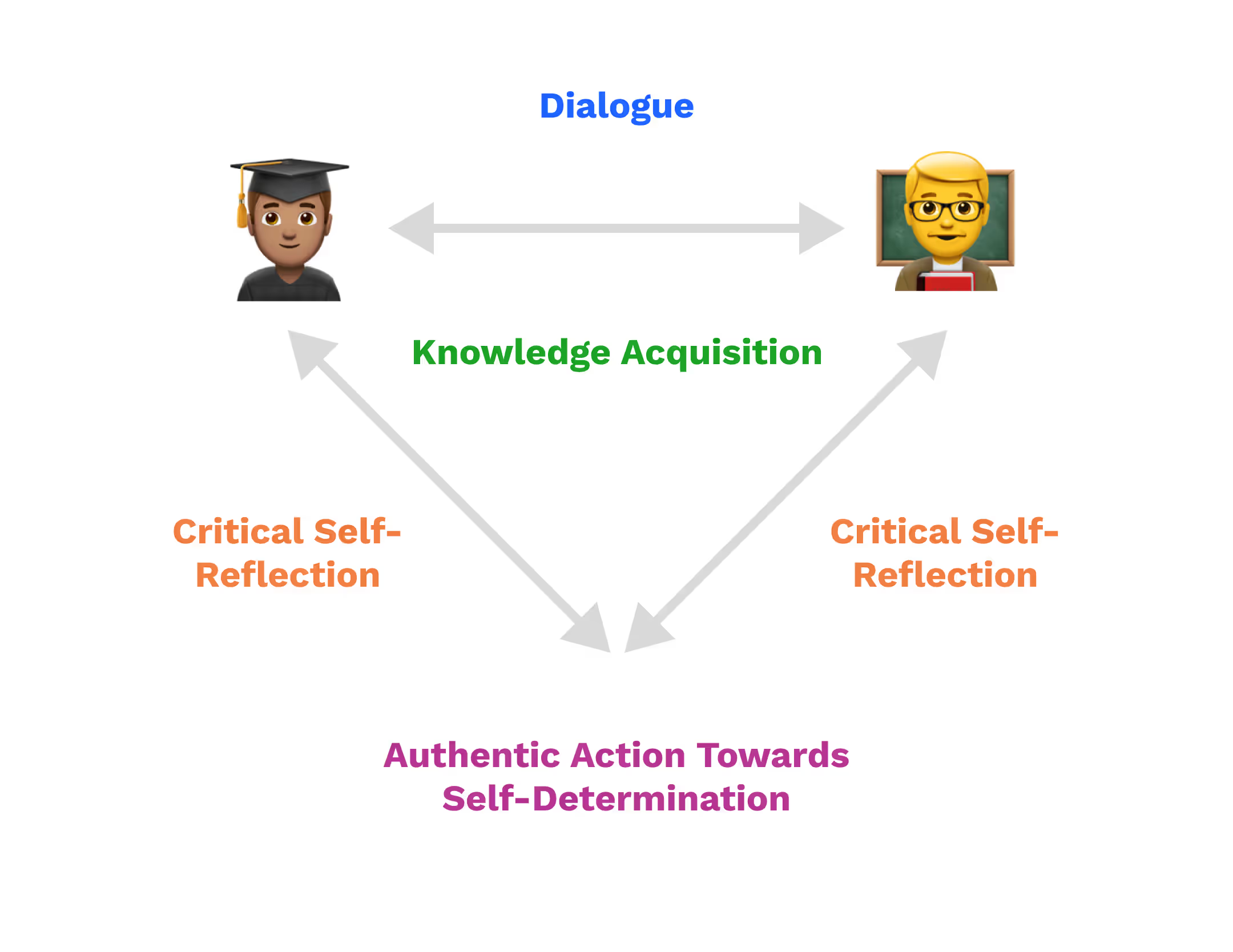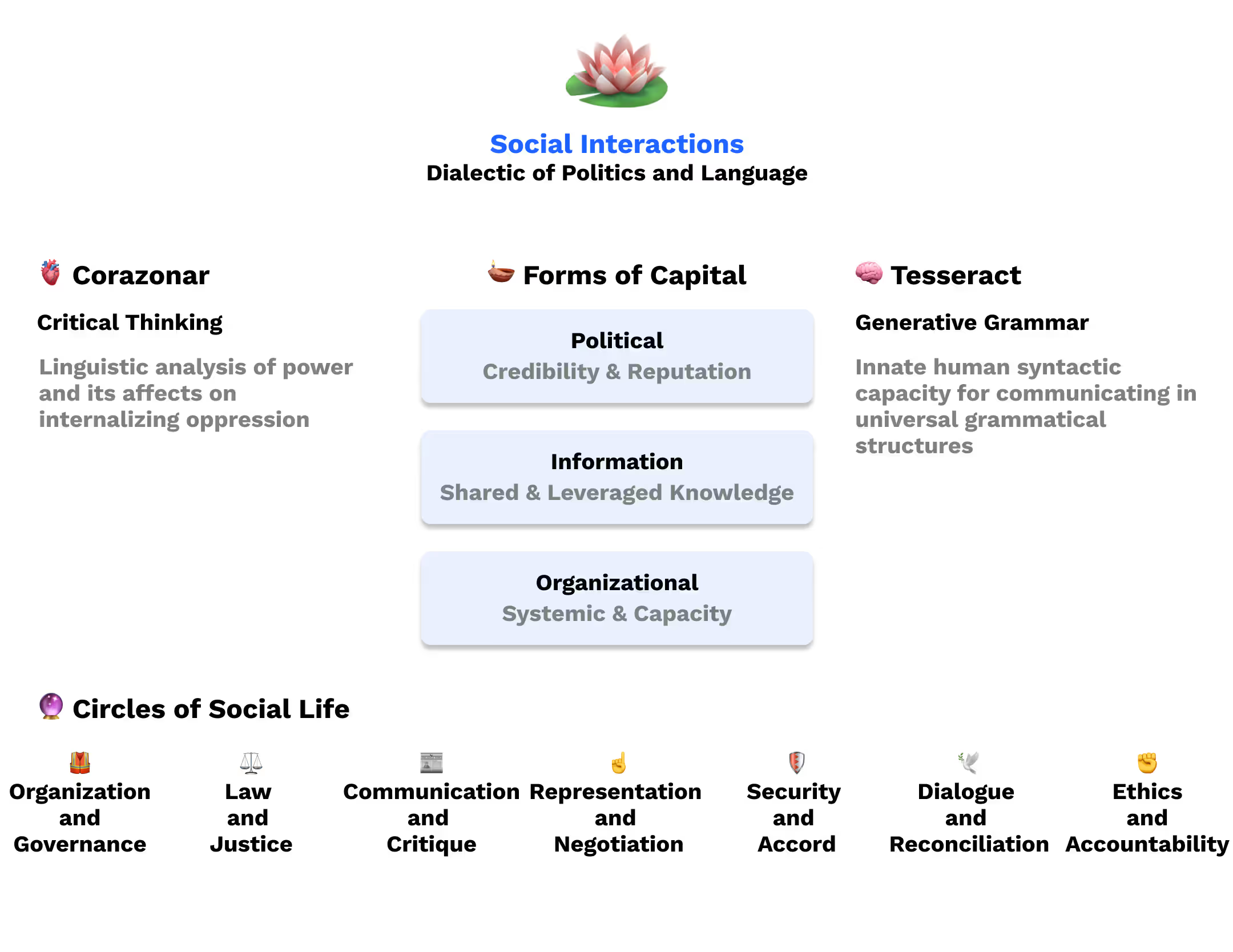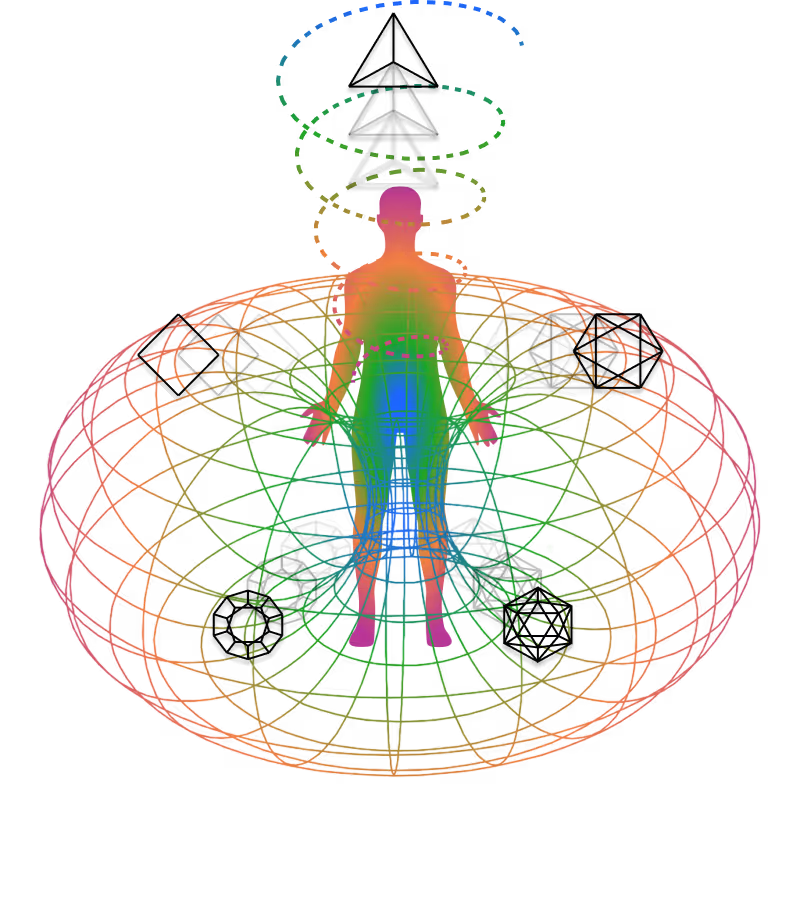Pedagogy of the Oppressed: Chapter 2 Review
Lesson Details
Chapter 2 introduces the Banking and Problem-posing models of education.

🎙️ Related Podclass
Lesson Content
From the previous chapter, we are given a political context to developing a pedagogy that works toward liberating the oppressed and their oppressors from the their mutually dehumanized status. In this chapter, we develop the oppressor-oppressed dialectic by examining the role between teachers and students under the analysis of Freire's pedagogical concept of the Banking Model of Education. Unlike the previous chapter which developed the hypotheses of power relations in education, Chapter 2 places you in the classroom where these methods play out. By focusing on the qualities of dialogue, Freire situates readers in a larger metaphor of material transactions, where the financialization of life through international monetary loans to reinforce a single Western currency became an instrument of imperial power, laundering its necrocapital influence throughout Latin America.
We focus on the classroom as a core environment for social conditioning and a perceived safe place for many young children growing up through periods of severe economic underdevelopment. It is through the specific lenses of pedagogy (child education versus andragogy which is adult education) we can witness and compare the paternalistic nature of the Banking model versus the Problem-posing model which Freire suggests in response to his critique. It is important to note that this analysis does not apply to every teacher in the educational field, yet it is universally acceptable to examine the role and influence of teachers and the system they operate within. The scope of conversation does not exclude the oppressors or those in elite social circles, in fact, it is a mirror to examine the loss of innocence through cultural programming that shapes everyones self-narrative (the lower case self). What this chapter analyzes is the most essential relationship in Self-development (capitalized Self), the teacher-student relationship. This relationship can be with anyone (and for some, any thing in nature) as every social interaction is a dialectic through our embodied personality.
Continuing the theme of financialization, Freire picks up from the previous chapters linked concepts between critical awareness and compulsion towards action through the interaction between teachers and students. It is important to distinguish the time, place, and educational infrastructure of Brazil indicating the lack of resources most people had, formal education was certainly a privilege not afforded to everyone and certainly excluded the majority that made up its regional workforce. What should be kept in mind while going through the rest of the chapter is the Finance Model, which enriches the dialectical analysis of social structure, societies, and broader cultural narratives. Mass public education is a rather recent phenomena and developed itself exponentially within the 20th century. While evaluating Freire's message, it is important to account for the absence of (secular or government-led) primary, secondary, or higher education opportunities across the Americas, the New World needed uneducated slaves to dominate and produce profit for genocidal colonizers and their twisted, dark fantasies.
The Banking Model of Education
Oppression—overwhelming control—is necrophilic; it is nourished by love of death, not life. The banking concept of education, which serves the interests of oppression, is also necrophilic.
Imagine a piggy bank. You are the pig and I deposit coins (knowledge) in you. The currency inside you gains interest without you realizing its intention and ulterior benefits, as it is the only currency you are allowed to receive and appreciate in your heart (mind). Any other currency attempting to be deposited is thwarted by design; the coin slot is said to be too small or shaped differently for other currencies to fit, I reprimanded you for violating the 'terms and conditions' that only my coins can be deposited in you, and you the piggy become plump, satiated, and defensive of the investment that you identify with (fat, lazy, and stupid). This duplicitous description has several examples, certainly it fits a stereotype of Americans that non-Americans project, but the pedagogical interest is in abusive relationships and the process of recognizing patterns of abuse.
Freire's critique of traditional educational models, where the teacher deposits their knowledge to a student perceiving them as an empty vessel waiting for instruction, reinforces students beliefs and acceptance of inequality. Indeed, the more invested we are to a narrative acquired through accepted social influencers, the more of these figurative currency weighs down our perception of reality where abuse can go unrecognized. Describing the knowledge as a (generous) "gift", a student is meant to be an empty, alienated vessel for the master (teacher) to dictate a 'motionless, static, compartmentalized, and predictable' reality.
Education thus becomes an act of depositing, in which the students are the depositories and the teacher is the depositor. Instead of communicating, the teacher issues communiques and makes deposits which the students patiently receive, memorize, and repeat. This is the "banking" concept of education, in which the scope of action allowed to the students extends only as far as receiving, filing, and storing the deposits.
Freire highlights the role of narration by a teacher as a fundamental tool for mechanistic programming of students. Teachers were exclusive influencers and distilled the primary expectations of society to prepare generations to serve out the interests of society. Learning the facts and mechanisms to assimilate to a perversion of reality is the direct result of projected ignorance, a pedagogy that negates the opportunity for learning and co-creation in favor of memorization of colonized State capitals, their leaders, and history. Indeed, my time throughout public school felt like a pipeline of U.S. National interest and upon light research of the Florida public school core standards, it reflects an increasingly corporate style of education that disables intellectual stimulation and praise for white supremacy within their Civics programs. Freire contrasts this by suggesting "Knowledge emerges only through invention and re-invention, through the restless, impatient, continuing, hopeful inquiry human beings pursue in the world, with the world, and with each other." Further describing the mechanics of this pedagogy, he lists off 10 banking education behaviors that mirror an oppressive society to mythologize its reason for existence (see graphic below):

Working off the symbolism of dominance, the banking style teacher is a role within an oppressive society. Their speech is an incantation of the societal narrative and their direction suppresses their inner creativity, "The more students work at storing the deposits entrusted to them, the less they develop the critical consciousness which would result from their intervention in the world as transformers of that world." By seeing their role as a humanitarian towards the bestial student, the oppressed are perceived as welfare recipients of the elites which allows them to antagonize their existence as fat, lazy, and stupid in contrast to the ideal student protagonized to hate the Other through self-interest.
Examining the Dichotomy
Dichotomy plays an important role in teaching duality. It is the difference between being in the world versus being with the world, one is an insignificant actor that survives to fit in, the other realizes the mutual interdependence of everything living and non-living towards co-creating reality. In Vedantic teachings, the parable of the rope and snake expresses many connected philosophical insights about metaphysics and more importantly can illustrate the learned ignorance of the banking model. You are walking on the road at night and assumingely spot a snake in your path, upon closer examination, it turns out to be a coiled rope. In between the first impression our senses receive and the realization our mind reveals, there is a series of learned concepts, felt emotions, and panicked thoughts. In darkness, it is hard to see reality for what it is and easily manifests our fears through rapid judgement. In the day, our visibility of the rope is clearer because we are able to perceive our surroundings (critical awareness) through the assistance of light (knowledge). What this parable is describing is more than just the limitations of sense perception, but our state of mind in examining reality.
Freire continues to describe how the bank-clerk educator utilizes their role to organize reality for the student to adapt to. The student's malleability, like the shape of the piggy bank, is molded around the prescribed knowledge monologued to them. The bank-clerk educators authority is their security, what they communicate to reify a worldview is guided by their own ignorance, fears, and false understanding of humanity that do not stimulate or challenge the reality they proscribe to students. Students only posses consciousness to receive reality from the outside world rather than being conscious to learn of society and of themselves.
Oppression—overwhelming control—is necrophilic; it is nourished by love of death, not life. The banking concept of education, which serves the interests of oppression, is also necrophilic. Based on a mechanistic, static, naturalistic, spatialized view of consciousness, it transforms students into receiving objects. It attempts to control thinking and action, leads women and men to adjust to the world, and inhibits their creative power.
This contradiction is important to understand as it directly relates to revolutionaries in the journey towards liberation. Freire does not deviate from his evaluation of revolutionary acts witnessed in Cold War Latin America and abroad. Recognizing that banking is an intentional act, one that fails to compel the oppressed towards liberation, helps to identify those truly committed to liberation. Authentic liberation as a process of humanization is not banking or financing knowledge, it is a praxis of reflection and transformation based on dialogue.

Problem-posing Education
Those truly committed to liberation must reject the banking concept in its entirety, adopting instead a concept of women and men as conscious beings, and consciousness as consciousness intent upon the world.
The latter half of Chapter 1 will focus on Problem-posing education as a solution to the banking model's contradiction between teacher and student. Before that, a minor sidebar on educational neuroscience that Freire puts forward that contrasts directly with banking, "Liberating education consists in acts of cognition, not transferrals of information." The connection between cognitive development and oppression certainly informs how we perceive the world, as Freire has cautiously spells out in both chapters, yet it is one of the earlier mentions of how 'cognizable objects' act as intermediaries for knowledge acquisition. Going back to previous lessons on comparative religious mythology, Marshall McLuhan's application Tetrad of Media Effects was not limited to metaphysical analysis of television and radio, but also of social objects (about 50 are indexed in The Medium is the Massage) like equilibrium, visual space, cash money, credit, pensions. The book is worth checking out for their blurbs of analysis that capture Freire's perspective so acutely. Cognizable objects are social mediums that we experience, reflect, and learn from. School, education, student, books - all are meta-cognized names we give to forms of human activity. The simplest formula to follow and understand this notion is Consciousness + Object = Experience. Hence the significant link between the cognized dialogue of student and teacher with Freire's critical consciousness.
The mid-20th century educational psyche
Before returning to the the two models, we can safely assert the contrast between passive and active dialogical education has been well established. I would recommend reviewing Freire's reflection on Chilean peasants and his incorporation of Sarte, as it reaffirms the role education contributes in developing subjectivity and the sense of "I-ness" in relation to the world. The lasting effects of global economic depression left many people across economic classes resource starved, schooling was a privilege few received (and were excluded from). Generations returning from war started families, they built for the first time or restored educational infrastructure in their communities. Resources to build schools (modeled after military bases) were allocated in anticipation of an ideal citizenry manufactured for a new global market, not for education that nurtures self-consciousness. That world truly experienced existential crisis with a transition to a unipolar hegemony of the United States; nuclear weapons, the administrative fall of empires coinciding with the rise of authoritarian State governments, the civil war between State and workers, or the broader (or "browner" as it is said by some of the least favorite educators I have experienced) accessibility of mass public education viz civil rights.
What Freire continues to express as the process of humanization is understood to be a response to the global paradigm shift of power narratives. The violent effects of 19th century gunboat imperialism and the continued 20th century anti-"Communism" imperialism presented itself in the psyche of millions subjected to foreign intervention, including who had access to education and their curriculum of study. Control of the power narrative and monopolization of economic interests, centered on teaching children to labor and accumulate the U.S. dollar, dictating the type of education and "career" trajectory one would inherit, develop, and pass along to future generations. The alternatives bled communities dry as resistance was met with the bullet, sponsored by a Western transnational corporation, carried out by those zombified to serve for blood money.
I would highly recommend "Writings for a Liberation Psychology" by Ignacio Martín-Baró which highlights trauma and childhood development over generations within El Salvador. This directly connects pedagogy and psychology profiles of the oppressed, both works compliment each other with different regional experiences. For adult education and organization workshops I recommend "A Future for the Excluded" by Clodomir Santos de Morais who was Freire's fellow prisoner-in-exile and labor activist that applies problem-posing education to the workplace. This material demonstrates the narrative of the Global South from their experience, themes that overlap in the upcoming chapters and are helpful to fill in any blanks to Freire's work.

Problem-posing as pedagogy
The metaphor of serving money (Matthew 6:24), by relating its behaviors and habits to education, renders all social interactions in a power dialectic. The banking model conditions education like private property, mammon, where knowledge is treated like a gift generously given to an empty mind. Property exchanged is akin to knowledge deposited as forms of capital, here we can see purely political exchange between teacher and student; political capital (credibility and reputation), informational capital (shared & leveraged knowledge), and organizational capital (systemic & capacity) as leading pedagogical examples. This metaphor to money exposes the impulses of desire to posses by positioning who is a purveyor and who is indebted. "I am lending you knowledge with interest" expresses an oppressive power dynamic that the problem-posing model alleviates. The banking model produces a hierarchical download of information to be memorized (but never scrutinized) where the Problem-posing model co-produces knowledge mutually informing student, teacher, and society. Co-productive dialogue between a teacher and student is the decommodification of knowledge, where the act of cognition (questioning, analyzing, critiquing, etc.) challenges the bank-clerk educator who pre-supposes ownership of knowledge like private property. Let us further examine Freire's problem-posing pedagogy and its immediate comparisons in education, for more examples of capital exchange, see the Ontology module concept art.

Problem-posing education affirms men and women as beings in the process of becoming—as unfinished, uncompleted beings in and with a likewise unfinished reality.
The notion of permanence, where we perceive the world as configured and fixed 'as such', misleads us from experiencing the eternal now, which is constantly changing and becoming otherwise. Humanization as a process, a life long process, begins when you are aware of your own incompleteness endowed by societal conditioning. Freire surmises that because people do not exist outside of society (reality), we are always in a human-world relationship (dialectic) temporarily limited by our false perceptions (fatalism). The banking model is the constant download of conditioned perception whereas the problem-posing model presents this very situation as a problem to critically reflect upon.
Reflecting on violence, rigid cultural expectations and beguiling superstitions are built-in effects to ensure people become reactionary to Others influencing change. Because the process of humanization is one of Self-reflection, Freire observes "Any situation in which some individuals prevent others from engaging in the process of inquiry is one of violence." Indeed, everyday relationships (family, friends, work, church, etc.) tend to invalidate expression for conformity, objectivizing parts of your character to engage with according to their perception. We know this today as narcissistic abuse, Freire in his time extracted these observations through the student-teacher relationship in the classroom, but selfishness is a universal characteristic.
Problem-posing education, as a humanist and liberating praxis, posits as fundamental that the people subjected to domination must fight for their emancipation.
The relationship between teacher and student becomes a mutual educational process between Subjects. This ebb-and-flow of inquiry does not serve oppressors, after all, questioning "why?" will make their skin crawl at the rebuke of their power, things must be fixed to their objectivity. Therefore problem-posing exists outside a dogmatic pyramid of alienation and authoritarianism, by existing outside of this social object, we can mutually transform our knowledge of the world towards action that transforms it. Revolution becomes a vocational role expressed in solidarity with the oppressed through dialogical action. In the next chapter, we we will explore generative themes and its application to curriculums of praxis towards awakening critical consciousness.
🤌 Key Terms
🤌 Reflection Questions
Reflect on key questions from this lesson in our Exploration Journal.

Lesson Materials






